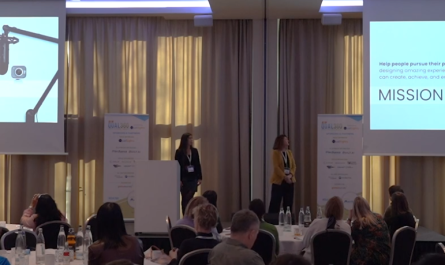User Research in Low Maturity Environments
- The challenges of setting up a research function in low maturity environments
- How important is it to quickly create business value and show user research impact in these environments
- What is the importance of prioritizing research, aligning stakeholders, and considering feedback
- Hiring people and fostering a team mindset play important roles in the organization
Dr. Flavius Kehr, Head of UX, SAP
Video transcript below (This is an AI generated summary. There may be inaccuracies.)
Flavius discusses his experience working with three large corporates, Bosch, IBM, and SAP, and how he has encountered challenges in setting up a research function in low maturity environments. He talks about his background in psychology and information systems and his different roles and positions he has held in these companies. Flavius also mentions that all three companies are mainly in the B2B sector, have at least 150,000 employees worldwide, and are tech companies.
He explains that UX and especially user research did not play a significant role in these environments, and he mentions his personal anecdote of seeing his expertise and insights ignored by the product teams. Flavius emphasizes the importance of creating business value quickly and showing the impact of user research in low maturity environments, which has become his personal guideline for succeeding in such environments.
He discusses the challenges of establishing a research function in a low maturity environment. They explain that research functions are often absent or hidden within product teams and create artifacts with mixed quality. Processes are not standardized, user research is not accounted for in any process, time and budget are scarce, and stakeholder buy-in is low. To address these challenges, the speaker suggests hiring people with an entrepreneurial mindset, starting with at least one senior person, bringing together engaged product managers and other allies, and gathering existing scattered and mixed-quality insights. They also mention the successful approach of founding a guild, which stems from medieval times where artisans formed groups to improve their skills and share knowledge.
He is discussing the importance of gathering and aligning stakeholders in order to implement User Research and establish it within an organization. The speaker addresses the potential benefits and value of research, the challenges of research not being implemented, and strategies for working together to overcome these challenges. The speaker identifies different types of projects that could be prioritized for investment, including short-tail projects, strategic projects, and rising star projects, and discusses the potential risks and rewards of each type of project. The speaker advocates for prioritizing at least one project in each category and stresses the importance of putting the research on the agenda before the project or strategy.
He emphasizes the importance of understanding the environment, needs, and jobs of users in low maturity environments where stakeholders may not have a lot of context analysis or interest in research. The speaker advises taking the low-level questions asked by stakeholders as a given and incorporating a little bit of higher-level understanding into testing, such as asking about the journey of using the product before and after its use. The researcher should also strive to build eminence by delivering recommendations based on their findings, rather than just providing objective data. The speaker encourages focusing on both quantitative and qualitative data in low maturity environments to build on the traditional business metrics with hard facts and numbers.
He discusses the importance of stakeholder feedback and tracking impact in low maturity environments. They suggest collecting stakeholder quotes to show the value of research and impact on a product level. Additionally, tracking expected levels of impact, number of recommendations produced, and shipped is recommended. The speaker acknowledges the challenges of low maturity environments but also highlights the learning opportunities that result from them. Finally, they emphasize the importance of buy-in from upper management and top management to succeed in such environments.
In conclusion, Flavius highlights the challenges faced, such as the absence or obscurity of research functions within product teams, non-standardised processes, limited resources, and low stakeholder buy-in. To overcome these challenges, he suggests hiring people with an entrepreneurial mindset, initiating with at least one senior person, and forming alliances with engaged product managers.
Furthermore, he also emphasises how crucial it is to assemble and coordinate stakeholders in order to properly apply and integrate user research into an organisation. In addition to measuring research impact and stressing the importance of higher management buy-in, the paper promotes stakeholder feedback collection. Along with discussing the possible risks and rewards connected with each project type, it also covers the importance of prioritising different project kinds, such as emerging plans, and strategic initiatives.
Explore the UX360 Virtual Summit vision for the future of UX/UI design! Discover the latest in technology and innovation with leaders from Microsoft, Google, Amazon, Facebook, LinkedIn, IBM, SAP, Indeed, U.S. Bank, Asana, Salesforce, Walmart, Airbnb and more. Don’t miss out – secure your spot now!










 by
by 


